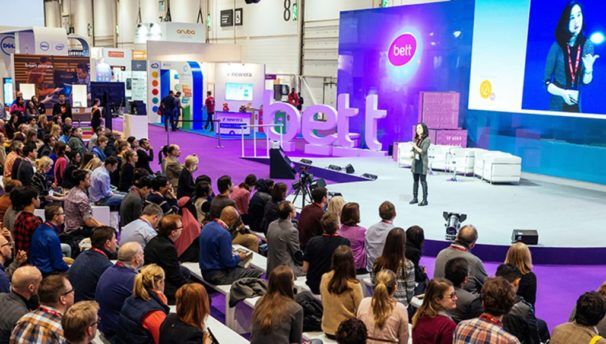Musings from BETT 2020: what’s in it for the higher education sector?

Author: Tom Rees-Davies, Educational Partnerships at FutureLearn
What do robotic puppies, a double decker bus, and renowned Ted Talker Sugata Mitra all have in common?
In the absence of an actual punchline, you may be unsurprised to hear that they were all star attractions at the recent BETT 2020 exhibition (‘star’ doing a lot of work on the bus there).
And so, to the ExCel in London’s Docklands for one of the world’s largest EdTech conferences and exhibitions – BETT 2020. The exhibition sprawled across both vast halls of the ExCel, with exhibitors turning out to showcase everything from note-taking software to the latest in Virtual Reality (VR) enhanced classroom experiences. BETT is a veritable smorgasbord of technology with a packed agenda of talks and keynotes from the leading lights of the industry.
Mitra was joined by luminaries such as Professor Brian Cox and Dame Darcey Bussell as well as Universities Minister Chris Skidmore. While the sheer scale of the event might be considered daunting (particularly to BETT rookies like myself), there is certainly something to be gained for everyone. After all, it’s not every day one gets the chance to chat with delegates from the Ministry of Education for Oman, leaders from online adult learning academies, and secondary school pupils all within the space of an hour. The difference of opinion and perspective from all corners was refreshing and the diversity of the geographical background of exhibitors and visitors alike was invigorating.
Indeed, what struck me most at BETT 2020 was the great presence of educators and officials from global markets looking to build bridges and forge networks with the UK. In particular, it was fantastic to meet with delegates from the Middle-East, many of whom are exponents of extremely innovative teaching and learning methods. Although the UK and US institutions are still often held up as the paragons of higher education in these countries, Middle-Eastern domestic institutions are innovating and developing to deliver excellent learning experiences, while also addressing industry skills gaps. If I’ve learnt one thing in the last year, it is that innovation can often be found in the most unlikely of places and it can be triggered by both necessity and inspiration.
Although BETT in 2020 felt focused more on the primary and secondary sectors, there is still value to be found for those of us from the higher education sector. Understanding how future students will learn prior to advancing to higher education is key to building courses that will appeal to these future generations and allow them to continue learning in a mode that they’re used to and suited to. For the higher education sector to keep a finger on the pulse as to how future undergraduate and postgraduate students are learning and attaining, events like BETT remain crucial. And this ‘pulse-checking’ should ensure that lifelong learning is delivered in a suitable and sustainable format.
Aside from this, BETT remains a great opportunity to network internationally, which, as an organisation with a burgeoning audience of international learners, was a great advantage. Around a quarter of FutureLearn learners come from Asia and it was exciting to meet with colleagues from the Department for International Trade and equivalent bodies in Asia and the Middle East to discuss how we can capitalise on this existing marketplace and look to grow it.
As we stand on the precipice of a new dawn, addressing the skills gaps across industries and across the globe, it is heartening to know that the areas of focus that FutureLearn has identified bears out in the global context. Apart from anything else, speaking to delegates at BETT has served as a robust sounding board for our future strategy. From Romania to China, Japan to Oman, one key theme emerged – the current higher education provision alone does not meet the needs of the global lifelong learner.




